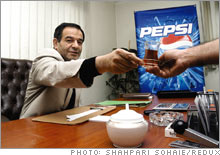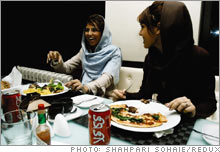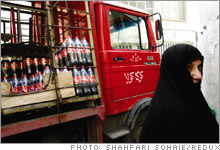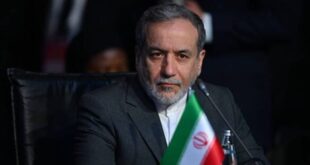Sanctions? Coke and Pepsi found a way around them and are battling for market share in Tehran with local Zamzam Cola. Fortune’s Eric Ellis reports. (Fortune Magazine) — Lunchtime in Tehran’s tony northern suburbs, and around the crowded tables at Nayeb restaurant, elegant Iranian women in Jackie O sunglasses and designer jeans pick at grilled Alborz trout and salad, their table chatter gliding effortlessly between French, English and their native Farsi.
The only visual clues that these lunching ladies aren’t dining at some smart New York City eatery but in the heart of Washington’s Axis of Evil are the expensive HermÄs scarves covering their blond-tipped hair in deference to the mullahs. And the drink of choice? This being revolutionary Iran, where alcohol is banned, the women are making do with Coca-Cola.
 |
| Sasan managing director E. Morad Abadi sits in his office. |
 |
| At this restaurant in Tehran, the drink of choice is American cola. |
 |
| The real thing: A Coca-Cola truck makes the rounds in Tehran, despite U.S. sanctions. |
| More from FORTUNE |
|
FORTUNE 500
Current Issue
Subscribe to Fortune
|
Coca-Cola? Isn’t corporate America prohibited by Washington’s sanctions from doing business in Iran? Yes, for the most part, says U.S. Treasury spokeswoman Molly Millerwise. But Treasury has bent the rules for foodstuffs, a loophole through which American drinks giants Coca-Cola (Charts) and PepsiCo (Charts) have been able to pour thousands of gallons of concentrate into Iran via Irish subsidiaries.
And that has allowed these brands, so much a symbol of America – and so much an affront to Iran’s conservative clerics – to open another front in their global cola war. After just a few years back in Iran, Coke and Pepsi have grabbed about half the national soft drink sales in what is one of the Middle East’s biggest drinks market.
That may be good news in Atlanta and Purchase, N.Y., respectively, where the companies are based, but it’s a hard fact for some of Iran’s theocrats to swallow. They want Iranians to shun “Great Satan” brands like Coke and Pepsi, which they claim send profits from Iranian sales to Israel. Hardliners like Mehdi Minai, a senior official of the Public Demands Council, frequently appear on state TV to denounce Coke and Pepsi, which he says stands for “Pay each penny to save Israel.”
Minai would rather Iranians drink Zamzam Cola, named after a blessed well in Mecca, the holiest place in Islam, or other local brands produced by Khoshgovar, which licenses Coke, and Sasan, which has the Pepsi franchise.
But Iran’s trendy young consumers are not as engaged in the Palestinian conflict as their Arab neighbors, anti-U.S. protests draw tiny crowds in Tehran these days, and opinion polls suggest that Iranians are tired of their government’s standoff with Washington over uranium enrichment. “I joke with customers not to buy this stuff because it’s American,” says Tehran storekeeper Reza Shahgholi, “but they don’t care. That only makes them want to buy it more.”
Zamzam’s 17 plants bottled Pepsi before the 1979 Islamist revolution. Now the company is controlled by the Foundation of the Dispossessed, a powerful bonyad, one of many religious charities Ayatollah Ruhollah Khomeini used to quasi-nationalize Iran’s economy.
Conceived as a way of helping Iran’s needy, the bonyads have become gold mines for the powerful. In the case of Zamzam, it answers to Iran’s Supreme Leader, Ayatollah Ali Khamenei, and Minai is lobbying him hard for a ban on the U.S. brands.
Coke and Pepsi shrug off the hardliner rhetoric and insist they are aren’t breaking any laws – American or Iranian – by licensing products in Iran through their concentrate subsidiaries in Ireland.
Says Pepsi spokesman Dick Detwiler: “PepsiCo has no equity investment in Sasan or any other enterprise in Iran and has no relationship with the government of Iran. We sell in strict accordance with all applicable U.S. laws and restrictions.”
Coke spokesman Charles Sutlive echoes Pepsi’s line, adding that Coke, which also licenses Fanta, Sprite and Dasani water through Khoshgovar, has “no tangible assets in Iran.”
Sasan managing director E. Morad Abadi is also sanguine about his Iranian critics. “We don’t listen to such remarks,” he says. “Iran’s law doesn’t say such a thing, so for us it’s business as usual.”
Boycotts of American beverages are nothing new in the Middle East. Coke has endured persistent – and false – claims that its logo insults the Koran. Iran’s diatribes against Pepsi were particularly shrill last July, when Israel clashed with the Tehran-backed Hezbollah in Lebanon.
Things have quieted since the end of the war, but the whispering campaign against Coke got so bad the company felt compelled to create a page on its Web site called “Middle East Rumors” to counter the myriad accusations.
But the fiercest battle is being fought in the marketplace, where Zamzam is defending its estimated 50 percent share of Iran’s $1 billion in annual drinks sales, and Coke seems to have a clear edge over Pepsi.
Shopkeeper Shahgholi owns a store in downtown Tehran around the corner from the former U.S. embassy, today a museum displaying “U.S. atrocities” that draws few visitors. “Nine of out ten bottles I sell are Coke,” he says. Sasan’s Abadi says Pepsi and Coke share about 40 percent of the market, but Khoshgovar commercial manager Fahime Askari puts Coke’s market share way ahead of Pepsi’s. Reliable sales figures are hard to come by.
Coke may be the real thing in Iran, but you won’t hear that familiar slogan here. Washington’s rules forbid U.S. companies to provide their licensees marketing support in Iran. It wouldn’t be welcomed anyway by the mullahs, who regard America-themed advertising as spiritual pollution. “Because of the relationship between Iran and America,” Abadi says, “we are not allowed to advertise in public places.”
The history of Coke and Pepsi in Iran is as chaotic and complex as the country’s politics. Both companies were active here before the revolution, when Pepsi dominated the market through Zamzam. In the 1950s, Coke tied up in Tehran with Sasan (Pepsi’s bottler since 2003) and with Khoshgovar, a private company owned by the Yazdi family that controlled distribution in Iran’s eastern territory.
Though arriving late, Coke pushed ahead of Pepsi after an ayatollah issued a fatwa, or religious ruling, banning Pepsi because its franchisee followed the Baha’i faith, which is regarded as heretical by Iran’s majority Shiite Muslims.
But Coke says it pulled out in 1978 as Khomeini’s revolution was building. The following year the Shah was ousted, and then came the 444-day siege of the U.S. embassy, a time when Iranians risked reprisals for even being seen with U.S. products. Washington slapped sanctions on Iran during the hostage drama, but by 1991 they were relaxed enough to allow Coke to return, again with Khoshgovar in the eastern part of the country.
Khoshgovar wanted to capture the Tehran market and bought a brewery in the capital that had been shut down by the teetotaling revolution. But under pressure from the regime, it sold the site to a Tehran investment company, Noushab, which had close links to then-President Akbar Hashemi Rafsanjani, today one of Iran’s richest men. In 1994, Coke licensed Noushab to sell its products in Tehran.
A year later U.S. President Bill Clinton tightened sanctions on Iran. That left Noushab with a new factory and millions of Coke bottles but no concentrate. Undaunted, Noushab devised its own syrups and filled Coke’s bottles with them. An outraged Coke sued for trademark infringement in Iran and actually won a $5 million ruling, to the surprise of observers skeptical about the Iranian judiciary.
That didn’t stop Noushab, leading to confusion in the marketplace when Clinton eased sanctions on foodstuffs in 1999 and Coke tied up again with Khoshgovar. For years Iran has been awash with Khoshgovar’s genuine Coke and what looked like Coke in Noushab’s real bottles.
Today, Iranians know that if Coke comes in plastic bottles, it’s Khoshgovar’s real Coke, but if it is in glass bottles, it’s likely Noushab’s faux Coke. Noushab declined a request for an interview, a company lawyer saying the group was “in turmoil.”
How will this all play out? Sasan deputy CEO Saeed Jalilian sees a younger, richer Iran forcing out the cheaper and politically correct local brands like Zamzam in favor of foreign brands.
“People are more relaxed now, and consumers trust these brands,” he says. “Lots of young people eat hamburgers. Fast food has changed their tastes.” In 2006, Iranians drank an average of 95 bottles of soft drink, he says, which he sees rising to 120 by 2010. Germany, with a similar-sized population, consumes 195 bottles per person annually.
The threat of war with the U.S. doesn’t bother Sasan either. Jalilian reckons that his company is a winner either way. If there’s a war and the American brands are again banned, he says, Sasan will take over Khoshgovar’s Coke market share with its local brand, Parsi Cola. And if there’s peace – or a U.S. victory – the foreign brands will triumph. While the mullahs in the mosque might beg to differ as political winds again buffet Iran, they may not be able to do much about it.
 Eurasia Press & News
Eurasia Press & News



